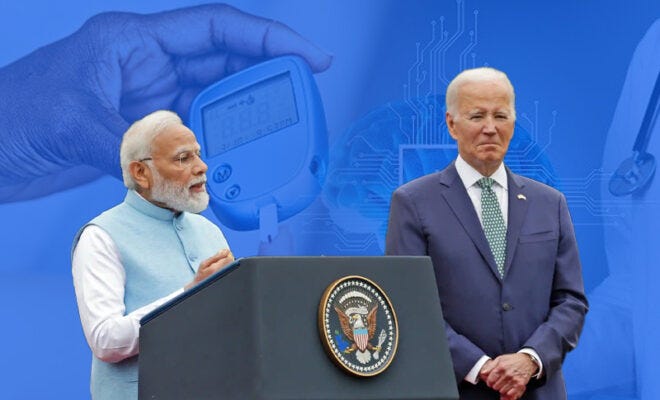Advancing Medical Frontiers: India and US Forge Partnerships for AI-Driven Healthcare Innovations
Several significant agreements have been signed between India and the United States during Prime Minister Narendra Modi’s visit, covering various industries, including healthcare. One notable collaboration involves the establishment of an AI-enabled digital pathology platform for cancer diagnosis and AI-based automated radiation treatment for certain malignancies. The U.S. National Cancer Institute will work alongside Indian experts to develop these initiatives.

Furthermore, the Indian Council of Medical Research (ICMR) and the U.S. National Institute of Diabetes and Digestive and Kidney Diseases will sign a contract to advance research on diabetes. The focus will be on fundamental, clinical, and translational research, utilizing AI to aid medical practitioners in patient care and intelligent health systems. This includes using machine learning and deep learning techniques for disease diagnosis, drug discovery, and patient risk detection.
The application of AI in healthcare offers unprecedented opportunities to improve patient outcomes, reduce costs, and enhance diagnostic capabilities. Recent investigations have explored AI-based applications in digital pathology, biomarker development, and therapeutics. These applications range from predicting therapy selection and response using biomarkers to developing analytical methodologies that leverage new data sources derived from traditional histology for treatment recommendations. The advancements in AI have resulted in more comprehensive diagnostic and interventional tools for the clinical oncology community, with the integration of various AI innovations.
In summary, the visit of Prime Minister Modi to the United States has led to the signing of significant agreements between the two nations, particularly in the healthcare sector. Collaborative efforts in AI-enabled digital pathology, cancer treatment, diabetes research, and the application of AI in healthcare have the potential to revolutionize disease diagnosis, treatment selection, and patient care. These advancements highlight the importance of leveraging AI techniques and fostering collaborations to address healthcare challenges and improve outcomes.


Comments
Post a Comment